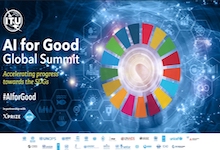AI fostering smart government
17 May 2018 02:00h
Event report
The session AI Fostering Smart Government was moderated by Mr Frans-Anton Vermast (Strategy Advisor & International Smart City Ambassador, Amsterdam Smart City). He started with an introductory speech about Amsterdam Smart City, its structure and purpose. Its team is currently focusing on digital transformation and social inclusion, and how to enhance public trust in local governments, as well as the accountability of private tech companies operating in the public sphere. He argued that the digital city is inclusive: data and technology do not have to constitute limitations for people. Furthermore, the smart city approach includes the following concepts: inclusivity, control, the need to be tailored to the people, legitimacy, openness, and finally, it has to be by everyone for everyone. Vermast also talked about the work of their DataLab meant to create innovation through competition. Their next project will be focused on the opening of algorithms. The final principle he talked about was the possibility for citizens to choose algorithms in accordance with the concept of ethical integrity.
Ms Carla Dualib (Secretary of Communication and Press at Diadema City Hall, Brazil) talked about Diadema Open Evolution’s work in engaging Brazilian cities to use artificial intelligence (AI) for the benefit of people. Furthermore, she talked about the project ‘House Beth Loba’, a project for protecting women that are subject to violence, and explained that AI can enhance the collection, analysis and mining of data collected through the project which can be used for social benefit. The Internet of Things (IoT) and AI are the core interests of Diadema. Finally, she stressed that it is crucial to talk to people using emerging technologies, to make them aware of how these technologies work and what they imply.
Mr Renato de Castro (SmartCity Expert) structured his speech around the current evolution of technologies for smart cities and how the general understanding of smart cities should be questioned. Smart cities are not just for big cities. He went on to give some examples to show how AI can be used for addressing local issues. The first project he talked about was implemented in Brazil, in small villages faced with drought. IoT helped tackled the situation by providing better tools for weather forecasts and for sending alerts to citizens. The second example he talked about stressed the concept of public-private-people partnerships. The inclusion of people will indeed increase with the implementation of smart cities.
After the panellists’ speeches, the moderator opened the floor for discussion. Dualib commented that smart citizens are needed for smart cities. De Castro followed up by adding that the United Nations and its own agencies should start speaking the language of smart cities in order to have a proactive role with global impact. On the question of defining ‘smart government’, de Castro argued that the concept is new for a lot of countries, thus, a starting point is to gather the best practices around the world. Dualib proposed creating an open international community-driven platform for sharing information about various initiatives and serving as a repository of ideas. Finally, the moderator added the need to share the lessons learned, for a more constructive strategy.
One question posed by the audience regarded best practices in data management and data ownership, in the context of the governmental duty of data protection. It was highlighted that data protection represents a challenge that needs a balanced regulation that does not limit the development of new technology. Another question was posed about the limitations in the making of infrastructure developing policies. De Castro argued that public-private partnerships are a key solution; however, big global entities are playing a new role challenging the creation and implementation of these policies. The concept of subsidiary was also proposed as a solution to the problem by Vermast. Finally, the last comment introduced the concept of fairness, accountability and transparency (FAT) to be used in enhancing the ethical integrity of algorithms. De Castro called upon academia to take on a role in this regard.
Related topics
Related event

